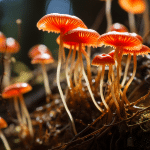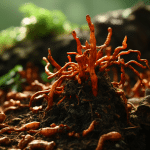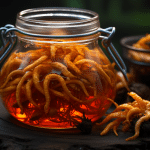Is cordyceps an allergies remedy? The short answer is yes, it CAN be helpful, but you need to understand the basics to make it actually work.
Cordyceps vs Allergies
Allergies can be a frustrating and disruptive aspect of many people’s lives. The constant sneezing, itchy eyes, and nasal congestion can make it difficult to focus on daily activities. If you’re tired of relying on over-the-counter medications that only provide temporary relief, it’s time to explore alternative solutions. One natural remedy that has gained significant attention in recent years for its potential allergy-relieving properties is cordyceps.
Understanding Cordyceps
Cordyceps is a type of fungus that grows primarily in the mountainous regions of Tibet and Nepal. It has a long history of use in traditional Chinese medicine, where it is revered for its various health benefits. Cordyceps is known for its adaptogenic properties, which means it helps the body adapt to stress and promotes overall well-being.
So Can Cordyceps Help with Allergies?
If you find yourself accumulating excessive amounts of tissues and antihistamines at specific times of year, it is possible that you are suffering from seasonal allergies. Seasonal allergy triggers differ, but common symptoms can include sneezes, coughs, runny noses, and itchiness.
There are many ways you can alleviate symptoms using natural remedies and supplements, from rinsing your nose with saline solution to adding mushroom powders to your diet. Learn how to relieve allergies naturally, and return to feeling like your best self, regardless of the season.
Hot off the presses this year, published in Biological and Pharmaceutical Bulletin, is research showing that cordyceps could play a role in treating allergies and inflammatory diseases.
Allergic conditions are associated with the activation of an unpleasant type of immune cell called mast cells. Mast cells are “master” regulators of your immune system.
Importantly, they contain capsules that contain biologically active substances called mediators. When those mediators are released, an inflammatory wrangle ensues. Some of these mediators include histamines and TNF-alpha.
What Science Says
Scientists have found that the cordyceps suppresses something called TSLP, which turns out to be the primary driver of mast cell development and activation.
They concluded that active molecules inside cordyceps mushrooms could potentially be applied in treating allergic inflammatory responses that are worsened by TSLP. This is a preliminary study, of course, but it is yet another reason to be excited about the awesome world of medicinal mushrooms!
Another natural way to suppress allergy symptoms is with functional mushroom supplements, particularly ones containing whole-food, organic reishi and maitake mushrooms. Reishi mushrooms have alleged anti-allergy properties, and can support reducing inflammation, while also supporting a healthy immune system.
Where to Buy Cordyceps to Fight Back Seasonal Allergies
You can find our favorite capsules, powders, and tincture’s on the following pages of our website and learn more about each individually:
Best Cordyceps Mushroom Gummies
Maitake mushrooms, which have a nice birds-eye look, are similar to reishi in their ability to support the immune system and may help to decrease allergy-related sensitivities. Maitake mushrooms help to promote a natural equilibrium in the body and healthy stress responses – qualities that are very needed by someone suffering from seasonal allergies.
Additional Resources:
Does Cordyceps Increase ATP Levels?
The Summary
Allergies occur when the immune system overreacts to harmless substances like pollen, dust mites, or pet dander. The body releases histamines, which trigger the common allergy symptoms.
Cordyceps contains bioactive compounds that possess anti-inflammatory and immunomodulatory properties. These compounds help regulate the immune response and reduce the production of histamines, thereby alleviating allergy symptoms. By addressing the root cause of allergies, cordyceps offers a holistic approach to managing allergic reactions.















